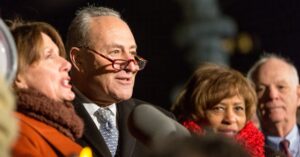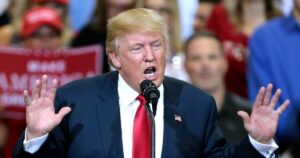Trump dismisses EU's zero-tariff proposal, cites trade imbalance
In a decisive move, President Donald Trump opted against accepting the European Union's proposal for a "zero-for-zero" tariff approach on industrial products.
The proposal was intended to abolish levies on goods, including chemicals and plastic, but Trump's dismissal highlights ongoing tensions over trade disparities.
The rejected deal, which aimed to remove tariffs on industrial imports from the EU, such as machinery and vehicles, was met with a firm refusal from Trump. According to his justification, the EU has historically enacted unequal trade practices, resulting in what he claims is a $350 billion deficit. The decision comes in the wake of new tariffs recently imposed by the United States, effective April 2.
Global market repercussions
This announcement has brought ripples in global financial markets. The STOXX Europe 600 index, a significant barometer of Europe's economic health, experienced a notable decline of 6% this past Monday before recuperating slightly to close with a 2.9% loss. Corrective remarks by Ursula von der Leyen, President of the European Commission, were partly responsible for this recovery, as she reiterated the EU's openness to negotiations.
The "zero-for-zero" tariff suggestion was initially introduced on February 19 to U.S. officials by the EU. Despite this proactive measure, President Trump maintains that a reciprocal relationship is yet to materialize, thus solidifying his decision to reject the proposal.
European Union's stance
In response to the refusal, key figures from the European Union, including von der Leyen and Maroš Šefčovič, have voiced their willingness to continue dialogues with the United States. Nonetheless, they also conveyed readiness to initiate countermeasures should the need arise, aiming to protect EU interests in global trade.
Von der Leyen stated the EU's commitment to reaching equitable agreements, similar to those achieved with various other trading partners. Despite Trump's firm stance, von der Leyen assured, "We stand ready to negotiate with the US." Meanwhile, Šefčovič highlighted that the United States perceives tariffs as a corrective tool rather than just a tactical choice.
President Trump remains steadfast, declaring that the ongoing deficit "is going to disappear fast" as the U.S. enforces its new tariff regime. The administration seeks to leverage these tariffs, potentially leading to fairer trade agreements or the continuance of what he termed "permanent tariffs."
Elon Musk's perspective on potential partnership
In the realm of international commerce, the concept of a zero-tariff landscape has been supported by high-profile individuals such as Elon Musk. The U.S. Department of Government Efficiency czar articulated hope for a budding partnership between the U.S. and Europe that could potentially culminate in a free-trade zone.
"We're not looking at that," Trump remarked, dismissing the zero-tariff offer. He underscored the need for fair negotiations and significant contributions from international partners through substantial tariffs.
Trump's proclivity for establishing what he calls "America First" policies remains integral to his trade strategy. By asserting that the table is being reset, he advocates for deals that truly favor the U.S., seeing an opportunity in these permanent tariffs to redefine trade terms.
Historical context of Transatlantic trade
Negotiations between the U.S. and the EU are not new. Efforts for a Transatlantic Trade and Investment Partnership had previously stalled in Trump's first term in 2019. Despite prior setbacks, the EU's commitment to exploring renewed talks signifies an ongoing effort to bridge the considerable trade gap.
Looking ahead, the trajectory of U.S.-EU relations remains dynamic and heavily influenced by these trade developments. Stakeholders across sectors continue to monitor the situation closely as both parties navigate these complexities in pursuit of equitable and strategic agreements.




